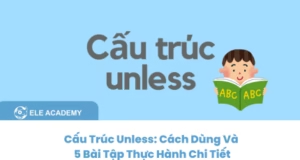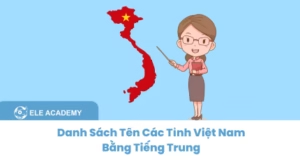Bạn có từng cảm thấy “lạc trôi” giữa các thì trong tiếng Anh? Không biết khi nào dùng quá khứ đơn, hiện tại hoàn thành, hay tương lai tiếp diễn? Đừng lo! Bài viết này sẽ giúp bạn hiểu rõ 12 thì trong tiếng Anh và nắm chắc các mẹo phân biệt dễ nhớ, giúp bạn sử dụng đúng trong mọi tình huống.
Tổng Quan Về 12 Thì Trong Tiếng Anh
Ngữ pháp tiếng Anh có tổng cộng 12 thì được chia thành 3 nhóm chính:
Thì Quá Khứ: Quá khứ đơn, Quá khứ tiếp diễn, Quá khứ hoàn thành, Quá khứ hoàn thành tiếp diễn.
Thì Hiện Tại: Hiện tại đơn, Hiện tại tiếp diễn, Hiện tại hoàn thành, Hiện tại hoàn thành tiếp diễn.
Thì Tương Lai: Tương lai đơn, Tương lai tiếp diễn, Tương lai hoàn thành, Tương lai hoàn thành tiếp diễn.
Chi Tiết 12 Thì Trong Tiếng Anh
Nhóm Thì Hiện Tại
Hiện tại đơn (Present Simple)

- Cấu trúc:
- Khẳng định: S + V(s/es)
- Phủ định: S + do/does + not + V
- Nghi vấn: Do/Does + S + V?
- Cách dùng: Diễn tả sự thật hiển nhiên, thói quen, lịch trình cố định.
- Ví dụ: The sun rises in the east. (Mặt trời mọc ở hướng đông.
Bài tập: Viết lại các câu sau ở dạng phủ định và nghi vấn.
- She works in a bank.
- They play football every Sunday.
- He likes ice cream.
- The train leaves at 6 PM.
- She speaks French fluently.
- We watch TV every night.
- He goes to school by bus.
- The shop opens at 9 AM.
- They study English on Mondays.
- My father reads the newspaper daily.
Hiện tại tiếp diễn (Present Continuous)
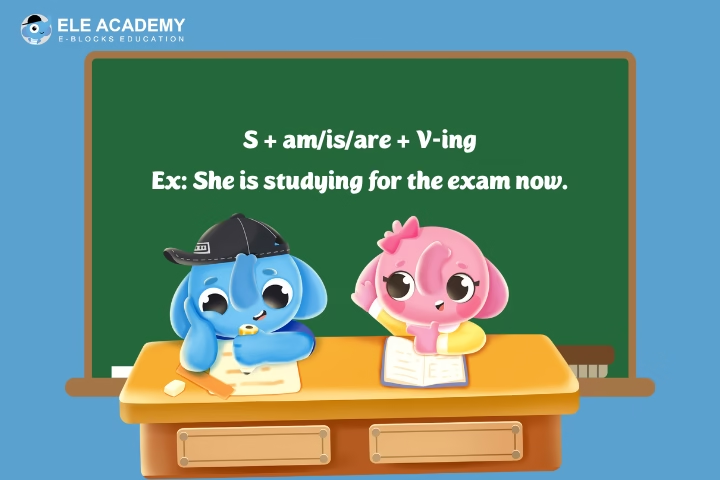
- Cấu trúc: S + am/is/are + V-ing
- Cách dùng: Mô tả hành động đang diễn ra tại thời điểm nói.
- Ví dụ: She is studying for the exam now.
Bài tập: Chia động từ trong ngoặc ở thì hiện tại tiếp diễn.
- She (read) a book at the moment.
- They (play) football now.
- We (watch) a movie.
- He (study) for the test.
- The kids (run) in the park.
- I (write) an email.
- She (cook) dinner.
- They (dance) at the party.
- We (listen) to music.
- He (talk) on the phone.
Hiện tại hoàn thành (Present Perfect)
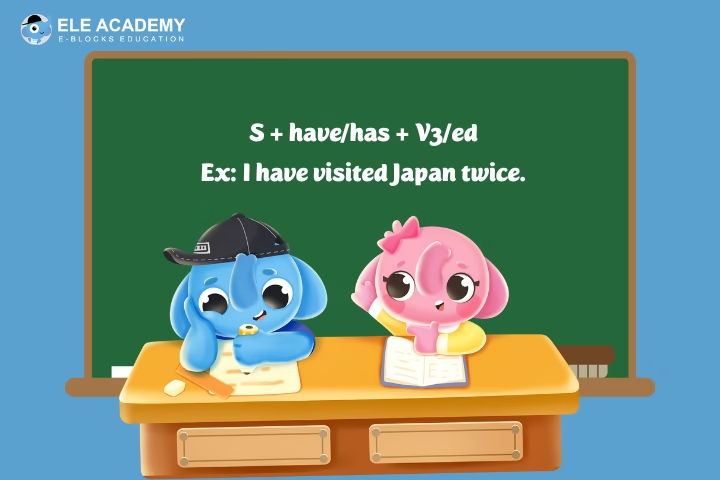
- Cấu trúc: S + have/has + V3/ed
- Cách dùng: Diễn tả hành động đã xảy ra nhưng vẫn liên quan đến hiện tại.
- Ví dụ: I have visited Japan twice.
Bài tập: Viết lại câu sử dụng thì hiện tại hoàn thành.
- I (visit) France twice.
- She (never/see) that movie.
- They (already/finish) their homework.
- He (just/eat) lunch.
- We (live) here for ten years.
- She (work) at this company since 2015.
- I (not/meet) him before.
- They (buy) a new car recently.
- He (travel) to many countries.
- We (not/see) each other for a long time.
Hiện tại hoàn thành tiếp diễn (Present Perfect Continuous)

- Cấu trúc: S + have/has + been + V-ing
- Cách dùng: Nhấn mạnh sự liên tục của hành động từ quá khứ đến hiện tại.
- Ví dụ: She has been working here for five years.
Bài tập 1: Chia động từ trong ngoặc ở thì hiện tại hoàn thành tiếp diễn.
- She (work) here since 2010.
- I (study) for the exam all day.
- They (play) football for two hours.
- He (wait) for the bus for 30 minutes.
- We (live) in this house since last summer.
- She (write) her novel for months.
- He (run) every morning since January.
- They (practice) the piano for three hours.
- I (not/sleep) well lately.
- The baby (cry) for a while.
Bài tập 2: Viết lại câu sử dụng thì hiện tại hoàn thành tiếp diễn.
- She started learning English five years ago. → She _______________ English for five years.
- We began working on the project in March. → We _______________ on the project since March.
- He started reading the book two hours ago. → He _______________ the book for two hours.
- They have played football for 30 minutes. → They _______________ football for 30 minutes.
- I started painting this picture last week. → I _______________ this picture since last week.
- She began cooking dinner an hour ago. → She _______________ dinner for an hour.
- We have traveled for three days. → We _______________ for three days.
- He has written his assignment for two hours. → He _______________ his assignment for two hours.
- They started watching TV at 7 PM. → They _______________ TV since 7 PM.
- She has been working at this company for five years. → She _______________ at this company for five years.
Bài tập 3: Điền từ thích hợp vào chỗ trống (for/since/already/just/yet).
- I have been studying Spanish _______ three years.
- She has _______ finished her homework.
- They have been waiting for the bus _______ an hour.
- We haven’t seen him _______ last summer.
- He has _______ completed his project.
- They have been playing video games _______ two hours.
- She hasn’t called me _______.
- I have been practicing the piano _______ I was five years old.
- He has _______ started learning Chinese.
- We have lived here _______ 2015.
Nhóm Thì Quá Khứ
Quá khứ đơn (Past Simple)
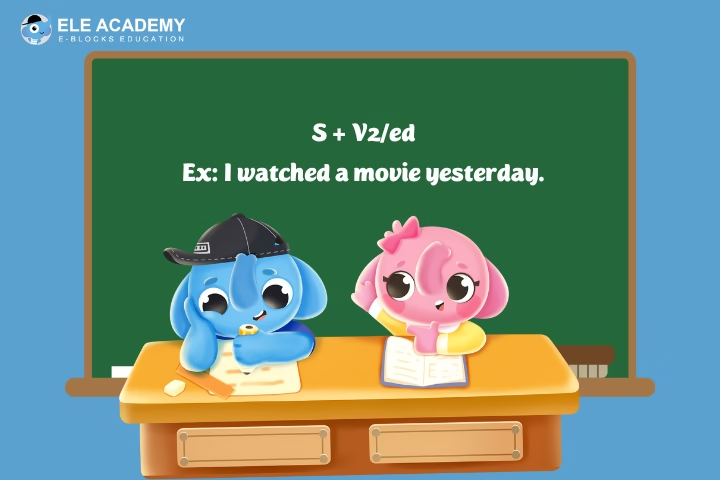
- Cấu trúc: S + V2/ed
- Cách dùng: Hành động đã xảy ra và kết thúc trong quá khứ.
- Ví dụ: I watched a movie yesterday.
Bài tập: Chia động từ trong ngoặc ở thì quá khứ đơn.
- They (go) to the zoo last Sunday.
- She (study) hard for the exam.
- I (watch) a great movie yesterday.
- We (travel) to Italy last summer.
- He (buy) a new laptop last week.
- They (not/play) football yesterday.
- The train (arrive) late last night.
- I (lose) my keys two days ago.
- She (finish) her homework on time.
- We (meet) an old friend at the mall.
Quá khứ tiếp diễn (Past Continuous)
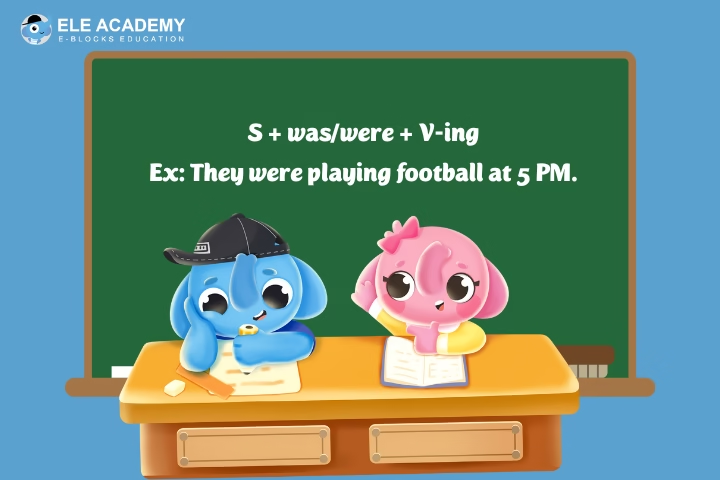
- Cấu trúc: S + was/were + V-ing
- Cách dùng: Mô tả hành động đang diễn ra tại một thời điểm trong quá khứ.
- Ví dụ: They were playing football at 5 PM.
Bài tập: Chia động từ trong ngoặc ở thì quá khứ tiếp diễn.
- They (play) basketball when it started to rain.
- She (cook) dinner while he was watching TV.
- I (study) when the phone rang.
- He (drive) home at 7 PM.
- The kids (sleep) when the fire alarm went off.
- We (have) a picnic when it began to rain.
- She (not/pay) attention during the lecture.
- They (dance) when the music stopped.
- He (write) an email when I saw him.
- I (wait) for the bus when you called me.
Quá khứ hoàn thành (Past Perfect)
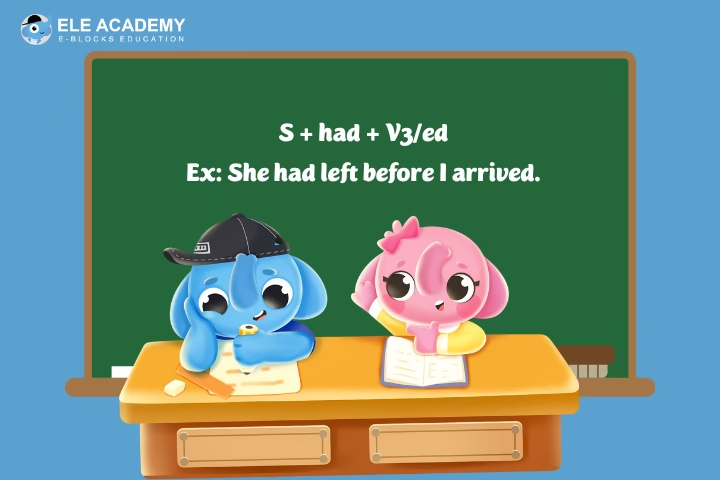
- Cấu trúc: S + had + V3/ed
- Cách dùng: Hành động xảy ra trước một hành động khác trong quá khứ.
- Ví dụ: She had left before I arrived.
Bài tập: Viết lại câu sử dụng thì quá khứ hoàn thành.
- I (never/see) that movie before last night.
- She (already/finish) her work when he arrived.
- We (leave) the house before it started raining.
- He (not/eat) anything before lunch.
- The train (depart) when we got to the station.
- They (meet) before the party.
- I (lose) my keys before getting home.
- She (read) the book before the exam.
- He (call) me before I had the chance to text him.
- We (never/visit) that place before last summer.
Quá khứ hoàn thành tiếp diễn (Past Perfect Continuous)
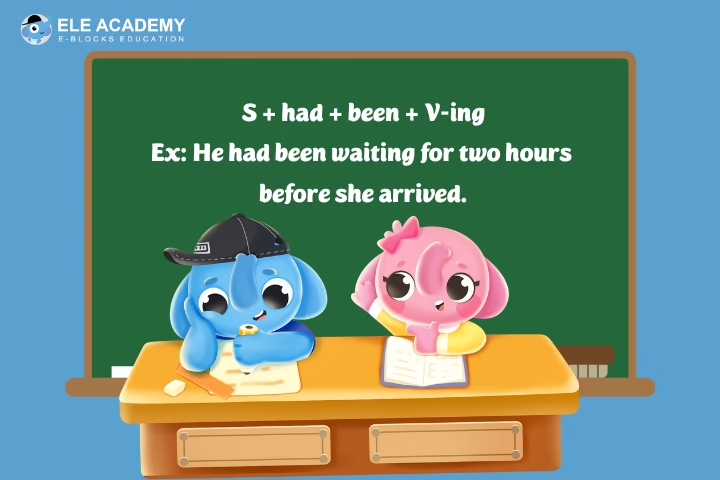
- Cấu trúc: S + had + been + V-ing
- Cách dùng: Nhấn mạnh quá trình của một hành động xảy ra trước một thời điểm khác trong quá khứ.
- Ví dụ: He had been waiting for two hours before she arrived.
Nhóm Thì Tương Lai
Tương lai đơn (Future Simple)
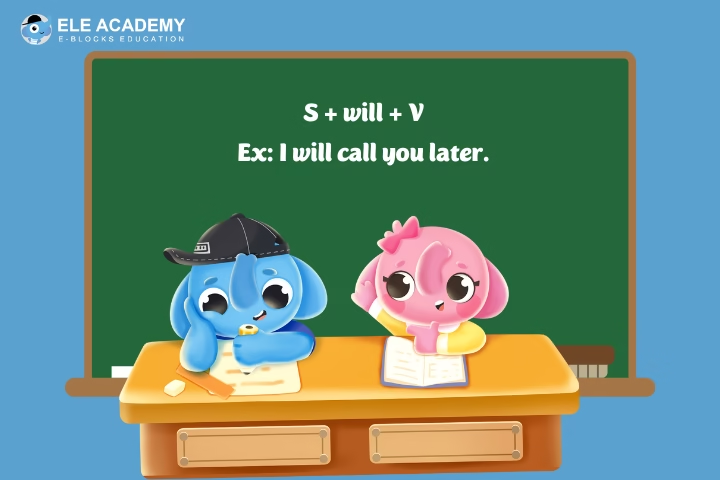
- Cấu trúc: S + will + V
- Cách dùng: Dự đoán, hứa hẹn, quyết định tức thì.
- Ví dụ: I will call you later.
Bài tập: Chia động từ trong ngoặc ở thì tương lai tiếp diễn.
- This time next week, she (work) in a new company.
- At 8 PM tomorrow, we (have) dinner.
- He (not/study) at this time next Sunday.
- They (travel) to Italy in July.
- I (watch) TV at 9 PM.
- She (sleep) when you arrive.
- We (not/use) our phones during the exam.
- He (wait) for you at the airport.
- They (dance) at the wedding.
- I (take) a shower when you call me.
Tương lai tiếp diễn (Future Continuous)

- Cấu trúc: S + will + be + V-ing
- Cách dùng: Hành động đang diễn ra tại một thời điểm trong tương lai.
- Ví dụ: This time tomorrow, I will be traveling to Paris.
Bài tập: Viết lại câu sử dụng thì tương lai hoàn thành.
- By this time next year, she (finish) her degree.
- They (complete) the project before the deadline.
- I (not/read) the book by tomorrow.
- We (arrive) before midnight.
- He (save) enough money to buy a house.
- She (learn) Spanish before her trip to Spain.
- They (visit) all the famous landmarks by the end of the tour.
- I (not/finish) my homework before dinner.
- He (write) his novel by the end of the year.
- We (build) a new office by next summer.
Tương lai hoàn thành (Future Perfect)
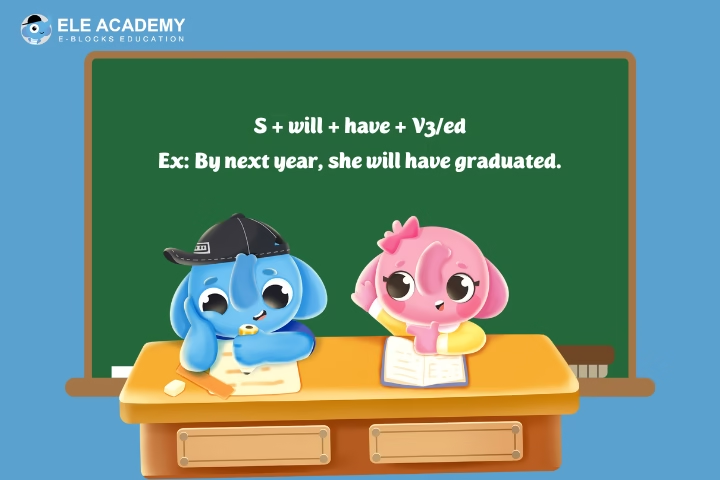
- Cấu trúc: S + will + have + V3/ed
- Cách dùng: Hành động sẽ hoàn thành trước một thời điểm trong tương lai.
- Ví dụ: By next year, she will have graduated.
Bài tập 1: Chia động từ trong ngoặc ở thì tương lai hoàn thành.
- By 10 AM tomorrow, she (finish) her report.
- They (complete) the construction by next month.
- I (read) the entire book by the end of the week.
- We (save) enough money for our vacation by summer.
- She (learn) Spanish before she moves to Spain.
- He (write) his first novel by next year.
- They (visit) all the famous landmarks before they return home.
- I (not/finish) my project before the deadline.
- By the time you arrive, we (cook) dinner.
- She (paint) the whole house by next weekend.
Bài tập 2: Viết lại câu sử dụng thì tương lai hoàn thành.
- She will complete her studies before she gets married. → She _______________ before she gets married.
- We will reach the airport before the flight takes off. → We _______________ before the flight takes off.
- He will write the report by tomorrow. → He _______________ by tomorrow.
- They will finish the project by the end of this week. → They _______________ by the end of this week.
- I will read 10 books before the summer ends. → I _______________ before the summer ends.
- We will finish decorating the house by Christmas. → We _______________ by Christmas.
- She will publish her first book by next year. → She _______________ by next year.
- They will build the school before the next academic year starts. → They _______________ before the next academic year starts.
- He will paint the whole apartment by Sunday. → He _______________ by Sunday.
- She will learn French before moving to Paris. → She _______________ before moving to Paris.
Bài tập 3: Điền vào chỗ trống với dạng đúng của động từ.
- By 2026, I _______ (graduate) from university.
- She _______ (finish) writing her thesis by the end of the month.
- By 9 PM, we _______ (eat) dinner.
- He _______ (save) enough money for a car by next summer.
- They _______ (build) the new school before September.
- I _______ (watch) all the episodes by next week.
- The company _______ (hire) 100 employees before December.
- By the time he arrives, we _______ (set up) the party.
- She _______ (travel) to 10 countries by the time she turns 30.
- We _______ (finish) the meeting before noon.
Tương lai hoàn thành tiếp diễn (Future Perfect Continuous)
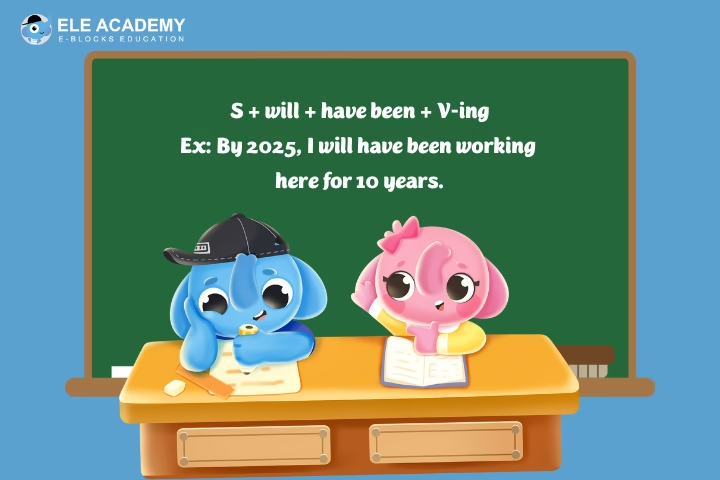
- Cấu trúc: S + will + have been + V-ing
- Cách dùng: Nhấn mạnh khoảng thời gian của một hành động kéo dài đến một thời điểm trong tương lai.
- Ví dụ: By 2025, I will have been working here for 10 years.
Bài tập: Chia động từ trong ngoặc ở thì tương lai hoàn thành tiếp diễn.
- By next year, she (work) at this company for 10 years.
- He (study) for his exam for a whole week by Monday.
- By December, we (live) in this house for three years.
- She (travel) around the world for a year by the time she returns.
- I (learn) Chinese for five months by next summer.
- By next Friday, they (prepare) for the competition for two weeks.
- He (play) football for 10 years by the end of this season.
- By 2027, she (teach) at this school for a decade.
- They (wait) at the airport for three hours by the time the plane arrives.
- I (read) this book for a week by tomorrow.
Mẹo Phân Biệt Các Thì Trong Tiếng Anh
Nhìn vào dấu hiệu thời gian
- Yesterday, last week, in 2010 → Quá khứ đơn.
- Now, at the moment → Hiện tại tiếp diễn.
- For, since, already, just → Hiện tại hoàn thành.
- Tomorrow, next year → Tương lai đơn.
Dựa vào ngữ cảnh câu
- Hành động đang xảy ra ngay bây giờ → Hiện tại tiếp diễn.
- Hành động đã xảy ra và kết thúc → Quá khứ đơn.
- Hành động lặp đi lặp lại → Hiện tại đơn.
- Hành động dự định từ trước → Tương lai gần (be going to).
Sử dụng câu hỏi “Khi nào?”
- Nếu không có thời gian xác định → Hiện tại hoàn thành.
- Nếu có thời gian trong quá khứ → Quá khứ đơn.
- Nếu đang nói về tương lai → Xem xét tương lai đơn, tiếp diễn hoặc hoàn thành.
Nắm vững 12 thì trong tiếng Anh sẽ giúp bạn tự tin hơn khi giao tiếp và viết lách. Hãy luyện tập mỗi ngày, đặc biệt là bằng cách áp dụng vào các tình huống thực tế. Nếu bạn còn thấy khó nhớ, hãy thử dùng sơ đồ tư duy hoặc bảng tổng hợp để dễ dàng hệ thống kiến thức. Chúc bạn học tốt!

